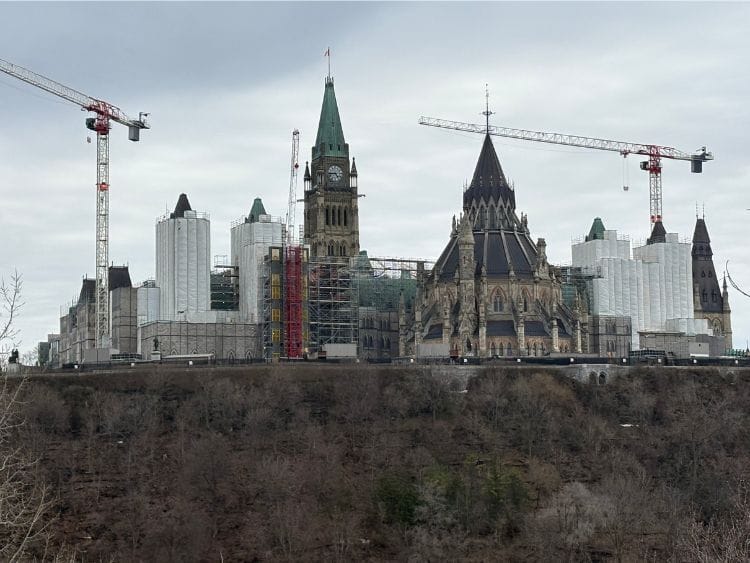For every Canadian voter, there is one election issue that will trump all others. For some, it’s the threat of U.S. imposed tariffs. For others it’s affordability. And then there are some issues which can cross multiple levels of government, like healthcare.
The National Association of Federal Retirees is a group that represents the interests of federal retirees across the country. With 170,000 members across Canada, 36,000 are located right here in the Capital city.
The group has partnered with the Council of Aging to identify what issues matter most to their members, and bring them directly to all Ottawa candidates from all parties who want to hold a seat in the House of Commons. To date, three candidates have responded. Some of their answers are included below in bulleted points.
The Lookout sat down with Steven Chapman, president of the Ottawa branch of the National Association of Federal Retirees, to see what they’ve been hearing.
The answers below are from Steven. The grey parts are from different candidates. Answers have been edited for clarity.
Healthcare
The situation that's facing families nationally with regard to access to primary care providers, the long wait times in emergency rooms, the closure of emergency rooms in rural areas and the curtailing of the hours. These are all issues of significant importance.
“Canada’s healthcare system is failing in many ways—long waits in emergency rooms, difficulty finding family doctors, and inadequate care overall. The NDP believes healthcare should be fully accessible with no hidden costs or reliance on credit cards. We are pushing for a universal healthcare plan that will cover dental care, medical care - including mental health services, and pharmacare.”
“Many immigrants arrive in Canada as qualified healthcare professionals but face insurmountable barriers to practicing due to red tape. My father faced a similar issue with his engineering qualifications. The NDP will reduce bureaucratic obstacles and streamline the credential recognition process for foreign-trained doctors and healthcare professionals,” - Hena Masjedee, NDP candidate for Ottawa South
Benefits and retirement
Income stability and retirement are a big issue. Public servants are fortunate in that we have access to the public service pension and we are particularly aware of the benefits of a defined benefits pension plan.
But increasingly, employers are moving away from defined benefits to defined contribution plans. We believe that the defined benefit plan gives stability so that people in their retirement can retire with dignity, knowing that they have a stable financial basis for their non-working years.
There's discussion about it not being affordable, maybe moving the retirement age from 65 to 67 when you can draw down on that. We're concerned about those kinds of moves. Those moves are kind of regressive and work against the benefits people have been paying into for a long time.
Last year we produced a report called The Power of Pensions that looked at the benefits that pensions bring to local communities. In a lot of areas across Canada, pension income is a significant, if not the biggest source of income for communities.
Pension plans
When we're talking with candidates, part of our message is protecting the pension plans that are in place, ensuring that there is no erosion to the current plan and just bringing to their attention the importance of pension income as a component of the economy. There is 25 per cent on every dollar. So 20 cents of every dollar spent on pensions comes back as income to the federal government that helps to continue to pay for services to the community.
“Fairness and security for retirees: Seniors should not face financial instability after a lifetime of work; Protect defined benefit pensions: Prevent conversion of defined benefit pensions without worker consent; Corporate accountability: Protect pensions when companies declare bankruptcy; prioritize pensioners over executives; Permanent improvements: Strengthen public pensions (e.g., CPP, OAS) and ensure consistent, long-term support instead of temporary measures; Trust in government: Seniors deserve predictable and stable retirement plans,” - Tristan Oliff, NDP candidate for Vanier
Support for the military
Veterans have experienced difficulty obtaining services and access to services through Veterans Affairs. Offices were closed in the past that provide local services, so direct interaction between retired service people and the government is increasingly challenging when they can't have face-to-face interaction in a local office. Even though the Veterans Charter has been in place for 20 years, the bureaucracy and red tape in obtaining services for veterans is increasingly complex.
This group of people have made sacrifices that other Canadians have not been called upon to make. They are facing challenges in the community from mental health, housing and abuse of drugs and alcohol.
“Governments — including the Liberal Government — have historically struggled to fully meet veterans' needs but are working to improve. Initiatives include: Mental Health Benefit Program — $140 million investment to provide immediate funding for veterans with mental health issues, bypassing red tape; Veterans Homelessness Program — $79 million investment to address homelessness among veterans; National Veterans Employment Strategy — Focuses on helping veterans reintegrate into civilian life and secure employment, with accommodations as needed.” - Bruce Fanjoy, Liberal candidate for Carleton
A ministry position
In the latest cabinet that Prime Minister Mark Carney has put in place, there is no Minister for Seniors Affairs. We understand that this is a lean cabinet that has been put in place to deal with a specific issue. But we're hoping that in the future there will be a focus on the needs of the aging community, given that as a percentage of the population, the retiree and senior community is growing and those needs are going to continue to be ascendant in the coming years.




